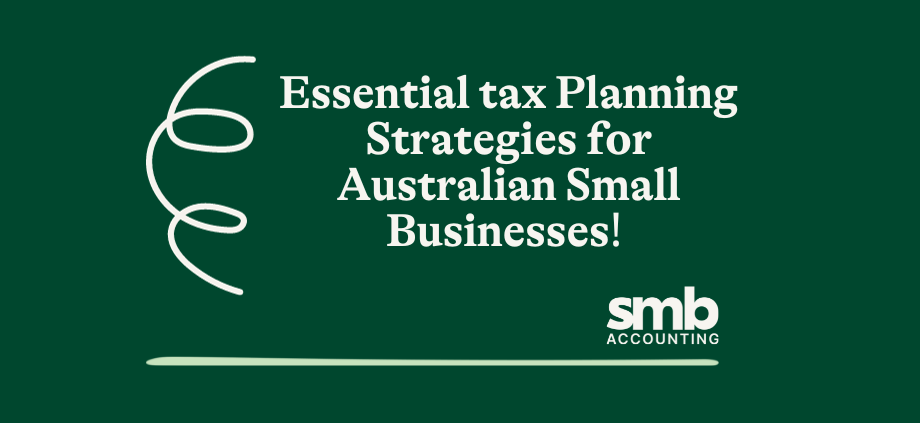Essential Tax Planning Strategies for Small Businesses in Australia
Tax planning is an essential aspect of successful small business management in Australia. By understanding and implementing effective tax strategies, business owners can ensure compliance, maximise savings, and improve their financial performance. At SMB Accounting, we are dedicated to providing educational, informative, helpful, and unique content to help Australian small business owners navigate the complex world of tax planning while unlocking growth opportunities and ensuring long-term success.
Tax planning involves analysing a business’s financial situation and applying tax laws and regulations to their advantage. This proactive approach allows you to identify potential tax savings, avoid potential pitfalls, and make better-informed decisions about your business’s financial strategies. In this article, we will explore essential tax planning strategies for Australian small businesses, focusing on areas such as selecting the appropriate business structure, leveraging tax breaks and deductions, optimising your taxation timing, and seeking professional advice from trusted accounting experts like SMB Accounting.
Selecting the Appropriate Business Structure: Lay the Foundation for Tax Efficiency
One of the first and most significant decisions you will make as a small business owner in Australia is choosing the appropriate business structure. Your chosen structure will impact not only tax efficiency but also legal liability, operating costs, and compliance requirements. The most common business structures in Australia include:
- Sole trader: A simple structure with minimal setup costs and lower compliance burden, suitable for individuals operating a small business.
- Partnership: Suitable for businesses operated by two or more individuals, allowing for shared profit and loss distribution.
- Company: A separate legal entity providing limited liability for shareholders, often suitable for larger businesses with increased operational complexity.
- Trust: A more complex structure involving a trustee who operates the business for the benefit trust beneficiaries, providing flexibility in distributing income and potential tax advantages.
Consulting with a tax professional, like SMB Accounting, can help you determine the optimal business structure based on your unique circumstances and goals, ensuring tax efficiency and compliance from the outset.
Leveraging Tax Breaks and Deductions: Maximise Your Small Business Tax Savings
Australian small businesses have access to various tax breaks and deductions that can help reduce their tax obligations and enhance profitability. Identifying and leveraging these opportunities effectively is a key aspect of successful tax planning. Common tax breaks and deductions for small businesses include:
- Instant asset write-off: Allows eligible businesses to claim an immediate deduction for the purchase of certain depreciable assets.
- Small business tax concessions: A range of tax concessions available to eligible small businesses, such as simplified trading stock rules, simplified depreciation rules, and reduced company tax rates.
- Business expense deductions: A wide variety of expenses may be tax-deductible, including employee wages, rent, utility costs, and professional services fees.
Working with a tax expert like SMB Accounting can ensure you are aware of and claim all relevant tax breaks and deductions, maximising your tax savings and enhancing your business’s financial performance.
Optimising Taxation Timing: Strategic Planning for Improved Cash Flow
Effective tax planning involves not only leveraging deductions and concessions but also strategically managing the timing of income and expenses to optimise tax outcomes. By considering the following tactics, small businesses can better manage their tax obligations and improve cash flow:
- Deferring income and accelerating expenses: If your business expects to be in a lower tax bracket in the next financial year, consider deferring income to the next year while accelerating deductible expenses into the current year.
- Strategic capital expenditure: Timing the purchase and disposal of depreciable assets can influence their tax treatment and impact cash flow. Consult with a tax professional to make informed decisions regarding capital expenditure.
- Reviewing and adjusting tax instalments: Regularly review your estimated taxable income projections and adjust your tax instalments accordingly to avoid overpaying and negatively impacting cash flow.
By strategically managing the timing of your income and expenses, you can improve your small business’s cash flow position while optimising your tax outcome.
Seek Professional Advice: Collaborate with Tax Experts for Optimal Tax Planning
Effective tax planning requires a deep understanding of the complex tax landscape, ever-changing regulations, and unique business circumstances. By partnering with trusted tax professionals like SMB Accounting, small business owners can access tailored advice and expert insights, ensuring they stay on top of their tax planning game. The benefits of seeking professional advice include:
- Gaining access to expert knowledge of the latest tax laws, regulations, and best practices, tailored specifically to your industry and business size.
- Saving time and reducing stress by entrusting your tax planning to specialists who understand the intricacies of the system.
- Ensuring compliance with tax regulations and minimising the risk of financial penalties or negative repercussions on your business reputation.
By collaborating with tax experts, you can make better-informed financial decisions, focus on growing your business, and ensure peace of mind in the knowledge that your tax planning is in capable hands.
Conclusion
Effective tax planning is essential in driving success and growth for small businesses in Australia. By selecting the appropriate business structure, leveraging tax breaks and deductions, optimising taxation timing, and seeking professional advice, business owners can maximise tax savings, ensure compliance, and improve overall financial performance. Partner with SMB Accounting to access tailored tax planning support and expert advice, helping you navigate the complexities of tax planning and secure long-term success for your business. Speak with our tax professional now!

